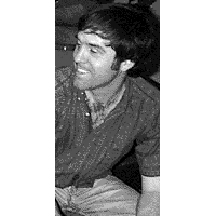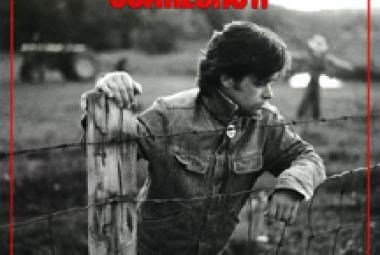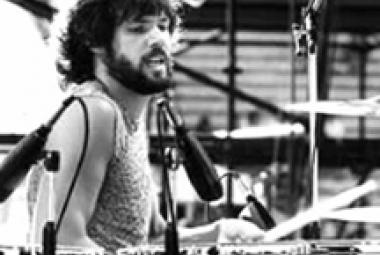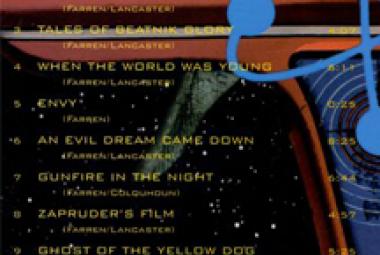Ron Silva and Steve Potterf grew up as neighbors in Point Loma, California and began listening to records together in the ninth grade. Silva recalls of those early days: “After a while Steve started getting into the music I liked – Beatles, early Stones. I remember sitting in his room playing guitars along to my dad’s Chuck Berry and Elvis Presley 45’s.”
Ron Silva and Steve Potterf, together with Ron’s brother Russell Silva played rock and roll in the Silva garage all through high school. Ron Silva began obsessively studying album covers, magazines, vintage photographs, and other sources in order to authentically capture the look of the Sixties, from the hair to the clothes to the shoes; this desire spread to the other bandmembers as well over time.
As Ron Silva left high school, he advertised for a rock band that he was thinking of forming; after being contacted by vocalist Jeff Scott (who had just left the seminal punk band the Dils) and drummer Josef Marc, he instead became the guitarist in their new band called the Hitmakers. They quickly became part of the growing DIY music scene in San Diego. A joint show in 1977 at the Adams Avenue Theatre by the Hitmakers, the Dils and the Zeros was the first big punk rock concert in the city. Later Steve Potterf joined the Hitmakers as their second guitarist, and Joel Kmak became their new drummer.
The renown of the Hitmakers grew through the state, and the band decided to relocate to San Francisco. The day before they left town, the band fired Steve Potterf because they said that they didn’t like his attitude. About two days later, Ron Silva decided to start his own band that became the Crawdaddys.
Ron Silva connected with Mark Zadarnowski – who was just learning to play bass guitar – through a mutual friend and fellow Beatles enthusiast named Tim LaMadrid. The first gig by the newly formed band the Crawdaddys was at Abbey Road in September 1978, with Ron’s brother Russell Silva – who went by the name “Scuzz” – sitting in on drums. By their third concert at the Lions’ Club in North Park, the line-up was Ron Silva (guitar), Steve Potterf (guitar), Mark Zadarnowski (bass), and Dan McLain (drums); McLain ran a local record store called Monty Rockers.
* * *
Jeff Scott phoned Ron Silva, and they patched things up over Silva’s leaving the Hitmakers. Scott was about to go to L.A. to play their band’s demo tape for Greg Shaw at Bomp! Records, and he offered to bring him and Steve Potterf along if they could lay down some tracks first. The Crawdaddys assembled in the Silva garage and recorded two original songs plus Chuck Berry’s “Oh Baby Doll” and Bo Diddley’s “Tiger in Your Tank”.
Ron Silva says of the meeting of the Crawdaddys with Greg Shaw: “In my opinion it would be fairly safe to say that [Steve] Potterf and I blew Shaw’s mind that day. We walked in, and Potterf had this absolutely devout Brian Jones thing going with the hair, and we both had the complete Downliners Sect ’64 look from head to toe. It was totally ridiculous and great at the same time. Shaw said, ‘Go back to San Diego and make an album, preferably for next to nothing, if you don’t mind.’ We didn’t.”
As described above, the resulting debut album, Crawdaddy Express by the Crawdaddys was comprised mostly of covers of R&B classics by Bo Diddley, Willie Dixon, Chuck Berry, and John Lee Hooker; plus a few from other sources, such as the old Hank Snow tune “I’m Movin’ On” and the magnificent Van Morrison song “Mystic Eyes” that opened the first album by Them. Only a few familiar songs were included on the album, such as “You Can’t Judge a Book” and “Down the Road a Piece”. Just two original recordings were included on the album, the title song “Crawdaddy Express” and “Got You in My Soul” (both written by Ron Silva and Steve Potterf).
* * *
Mike Stax was born in England and had tried to interest locals in starting a 1960’s style R&B band without success. Stax wrote Ron Silva in 1980, who invited him to join the band on bass guitar. Numerous changes in the line-up took place over the next several years – even Mojo Nixon joined up on guitar at one point – and some are remembered by other bandmembers only by their first name. Once the band tried to soldier on without a guitarist, and another time without a drummer; for a time, the band changed their name to the Howling Men, named for a Twilight Zone episode. Eventually, the Crawdaddys basically squandered their reputation as one of San Diego’s greatest rock bands. After just 6½ months in the States, Mike Stax returned home to England.
* * *
As often happens following the break-up of a popular rock band, the Crawdaddys’ remaining songs – frequently, as here, presented as an unreleased album – were packaged into a CD by Voxx Records called Here ’Tis. The CD was originally released in 1987 and was reissued in 1994. The brief liner notes by Ron Silva (dated October 1986) end by presenting the CD: “So why wait until tomorrow! HERE ’TIS!”
If anything, the Crawdaddys work even harder on the performances of their original songs that make up about half of the tracks on the Here ’Tis CD, like Ron Silva’s “You’re Gonna Need My Love Someday”, “I Just Don’t Understand” and “Start Talkin’”, with the latter song featuring a fierce instrumental break.
The bandmembers in the Crawdaddys listed on the Here ’Tis CD are Ron Silva, Fred Sanders (actually Keith Fisher, with the name petulantly changed due to his threats to file suit to prevent the release of the CD), Peter Michael Miesner, Jack Lopez, Mike Dixson Stax, Gordon Moss, and Steve Horn. Also mentioned are Carl Rusk as “production consultant”, Josef Marc as “sort of the producer” on some tracks, and Jeff Scott as “definitely like a father to us”.
* * *
On May 29, 2011, at a Rhino Records pop-up store in San Diego, the Crawdaddys showed up unexpectedly with a reunion concert that included former members Ron Silva, Peter Miesner, and Keith Fisher. After noting the surprise at the Crawdaddys being there at all, the L.A. Weekly report on the concert continued: “Another surprise was how hot and vital the band sounded, even after being dormant for so many years. You could certainly hear where latter-day ’60s revivalists like the Hives got their ideas, as singer-guitarist Ron Silva snarled his way through a set of Crawdaddys originals and vintage covers of primal rock classics like ‘Oh Baby Doll’, ‘Slow Down’ and ‘Let the Good Times Roll’. The group were at their best on Rolling Stones-style blues rockers like ‘Bald Headed Woman’, but they also deftly pulled off poppier tunes like the Knickerbockers’ Beatles sound-alike ‘Lies’ and a yearning, affecting version of the Velvet Underground’s bittersweet ‘There She Goes [Again]’.”
(January 2015/2)















